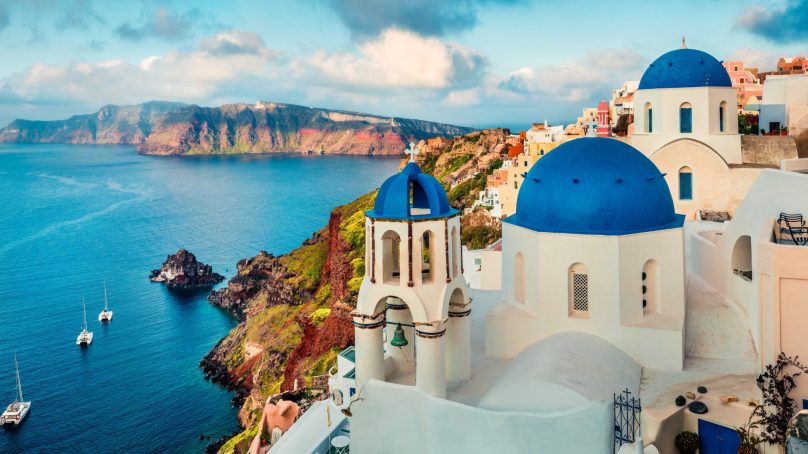Recognized as one of the world’s leaders in tourism, Greece certainly isn’t resting on its laurels and continues to raise the bar higher still for its competitors. Ralph Nader, CEO of Amber Consulting, breaks down this impressive market.
With its beautiful beaches, historical architecture, fresh seafood and awesome nightlife, none of us should be surprised to hear that Greece has been voted Travel Insider’s number one travel destination for 2020. However, behind the scenes and the people who work hard to sustain tourism growth is a solid backbone of support which continues to play a key part in Greece’s enduring tourism success.
Today, Greece is moving away from the sun-sea-and-sand model and, instead, promoting itself as an all-year-round touristic destination by applying a digital transformation. In 2020, through a partnership with the UNWTO, Greece is aiming to improve its tourism sector by making sustainable tourism growth its priority.
Untapped potential
Concentrated in five: Greece’s arrivals, overnight stays and tourism revenue were distributed largely across five of the country’s regions. The South Aegean Region, which includes popular destinations such as Mykonos, Santorini and Rhodes; Crete; Central Macedonia; Attica; and the Ionian Islands welcomed 77 percent of Greece’s arrivals, accounted for 84 percent of the country’s overnight stays and brought in 88 percent of tourism revenue (travel receipts). In light of these figures, the government is looking to focus on developing the country’s lesser-known destinations.
Seasonality spikes: data shows that overnight stays in Greece from June to September 2019 accounted for 71 percent of the entire year’s total. In another sign of the challenges stemming from seasonality that the tourism industry faces, the average hotel occupancy for May over the last two years stood at around 58 percent, while in August, it rose to 86 percent.
A 10-year, seven-pillar plan: armed with a strong strategic tourism plan, the Greek authority is committed to creating: “A sustainable development, diversification of the tourism product, season expansion, the emergence of new destinations, the enhancement of the value added product, which will lead to salary raises for the sector’s workforce; and strengthening the country’s image in international markets.”
Greece’s strategic tourism plan for the 10- year period from 2021 to 2030 is based on seven pillars:
• Adequate access to attract more tourism flows in the coming years
• Evaluating and improving private infrastructure and its sustainable management and development
• Evaluating and managing the guest experience and improving public
• The improvement of tourism education and training
• Product development and promotion
• Launching collaborations with tourism stakeholders
• Dealing with gaps in tourism legislation infrastructure
Quantitative goals: Greece is targeting double-digit tourism revenue growth of 10 percent this year, along with 5 percent increase in arrivals, a 5 percent rise in overnight stays, a 4.5 percent increase in the average spending of each tourist and a 3 percent increase in beds in 4 and 5-star hotels.
Higher profile: shoring up the plan, Greece’s euro 8 million tourism campaign for 2020 was launched in January by the Greek National Tourism Organization (GNTO). Much of the campaign (70 percent) will be focused on using social media and digital tools, largely targeting Europe, the US and Canada.
Titled ‘Greece – Always in Season’, the campaign dovetails with the national strategy to attract tourists to the country all year round and promote its identity and competitive advantages. The goals of the GNTO will also include creating a network of Greek tourism ambassadors, in collaboration with tour operators, who will highlight both the region’s local features and help revamp Greece’s image at international tourism exhibitions.
In addition, the country is set to be given a greater media profile, with plans for it to be featured in Euronews, BBC, Bloomberg, the Wall Street Journal and the Financial Times. Advertising will also be done via Google, Tripadvisor and Twitter, with Greece to be promoted through Mastercard in a bid to attract higher-profile visitors.
Addressing the challenges
Like its neighbors, Greece faces two main challenges when looking to boost tourism: the refugee crisis and the coronavirus.
(Covid 19), according to a report released by Alpha Bank. However, luckily, its strong brand name and the seasonal tourist flows are likely to maintain the sector in 2020. Moreover, since 85 percent of tourist arrivals visiting Greece are recorded in the May-to-October period, analysts expect this seasonal pattern, as well as the strengthening of the US dollar against the euro to, mitigate the effects of both the virus and the refugee flows. On another positive note, Greece’s high summer temperatures are expected to put a brake on the further spread of the coronavirus.
Invest and innovate
Hotel renovation: Greek hotels have invested heavily in renovating their properties. Between 2017 and 2019, they channeled almost 3 billion euros into renovations alone, recording annual investments of around 1 billion euros in the sector.
New airport: construction work has started to develop the new Kasteli airport on Crete, which will replace the island’s main airport in Heraklion.
Cruise tourism: MSC Cruises will launch a new East Mediterranean route in May 2021, with Piraeus serving as the home port. The move paves the way for a 15 percent increase in Greek cruise tourism and makes the cruise offering one of the industry’s fastest-growing segments. In line with these plans, the Piraeus Port Authority has awarded a euro 136 million
contract to Greek construction company TEKAL to expand the cruise terminal
facilities at the port.
Santorini, Go Green: the ministry has launched a new campaign named ‘Plasticfree Santorini’ which encourages the entire country to reduce the use of plastic.


















